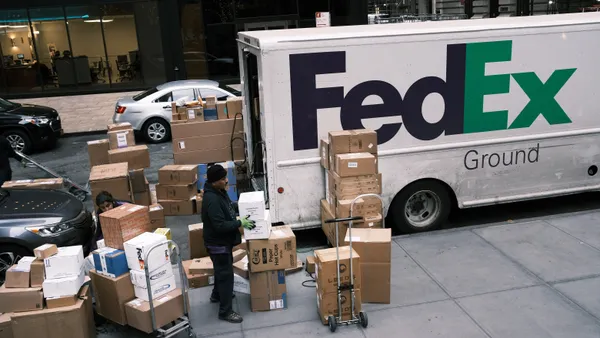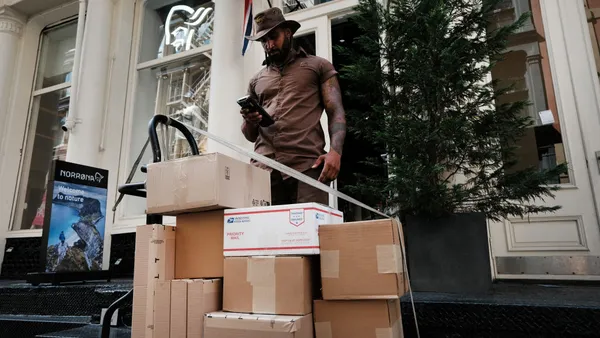Fulfillment and last-mile delivery provider Point Pickup Technologies has ceased operations and is seeking a sale, according to Peter Hurwitz, a principal at Dundon Advisers assigned to oversee the process.
The company aims to pay off its debts by selling its assets or the business itself, according to recent filings in Miami-Dade County Circuit Court. It’s on the hook for more than $60.2 million combined to its secured creditors, per a Feb. 23 filing from Hurwitz’s counsel. Various unsecured creditors, including Walmart, DoorDash and ProShip, are also seeking payment.
Despite ceasing operations, Point Pickup is still holding onto employees for a possible sale, Hurwitz, the company's assignee for the benefit of creditors, told Judge Thomas Rebull in a virtual court hearing on Monday. That’s something it wants to get done quickly before it loses too much value.
"Being able to hold it all together and just show demonstrations of that technology for the value to be able to sell it becomes more challenging" as time goes on, Hurwitz said.
The case includes six entities under the Point Pickup umbrella: Point Pickup Technologies, Point Pickup Enterprises, Point Pickup Now, Point Pickup Management, GigPoint and GrocerKey. GrocerKey, a white-label e-commerce platform acquired in 2021, is currently the only continuing operation, Hurwitz said.
Shifting delivery market
Founded in 2015, Point Pickup offered same-day fulfillment and delivery services across the U.S. via flex workers, serving brands such as Walmart, Kroger, The Home Depot, GameStop and 7-Eleven. The company has touted its ability to connect with retailers’ e-commerce infrastructure, allowing the client to control the customer experience throughout the shopping journey.
A few years ago, Point Pickup's future looked bright. The company landed $30 million in funding from BBH Capital Partners in 2020 as the COVID-19 pandemic ramped up interest in same-day home delivery services.
“Point Pickup’s unique market position and impressive growth are exactly what we look for in a company,” Jeffrey Price, a board member of Point Pickup and BBH managing director, said in a 2020 news release. “Point Pickup is well positioned to take advantage of the significant uptick we’re seeing in the final-mile delivery market.”
The company expanded its capabilities in July 2023 when it announced a merger with Pickup Now. While Point Pickup focused on the retail, grocery and convenience sectors, Pickup Now concentrated on white-glove delivery and assembly for bulky goods like furniture. Pickup Now had been searching for either more fundraising or a strategic partner to fuel more growth and mitigate economic pressures.
"I'll only say the macroeconomic conditions over the past year have been unsettling at best across all businesses and industries," Brian Kava, then-CEO of Pickup Now, told Supply Chain Dive in an August interview.
Emerging delivery providers continue to be strained in the current demand environment. Weak volume levels, aggressive pricing among carriers, a reduced appetite for investment and market saturation has challenged many providers, LPF Spend Management founder Nate Skiver said in a LinkedIn post last month as rumors of Point Pickup's demise surfaced.
"It’s unfortunate, but it also reflects the market," Skiver said.
Selling 'melting ice cubes'
Hurwitz wants to keep Point Pickup's network of drivers and clients in place until a sale can be consummated, according to a March 8 filing from Hurwitz’s counsel. A sale of the company would “not only maximize the value to creditors but will keep most of the employees employed." Otherwise, its assets “will likely be liquidated at or for de minimis value,” the filing added.
To fund the sale process, Hurwitz’s counsel asked the court four days later to approve financing of up to $2.2 million from two lenders. The lenders' assigned signatories are BBH's Price and Clete Brewer, co-founder and co-managing partner of NewRoad Capital Partners. The investment firm is also a Pickup Now investor.
Approving the financing will allow Point Pickup to facilitate sales in an expedited fashion, said Eyal Berger, a partner at Akerman LLP and counsel for Hurwitz, during Monday's hearing.
"These assets are basically melting ice cubes — they are losing money," Berger said.















